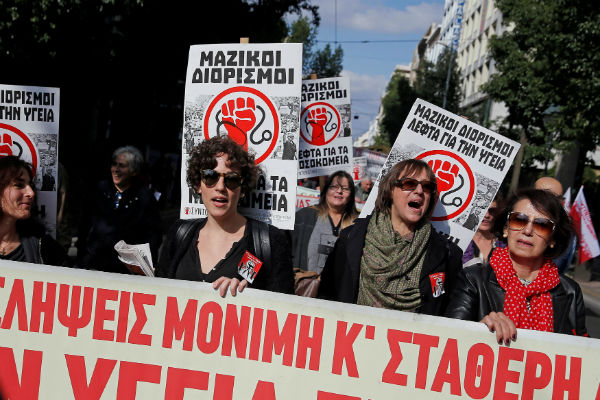About 500,000 ADEDY union members walk off jobs

ATHENS (Reuters) — Greece’s largest public sector union staged a 24-hour walkout on Wednesday, demanding wage and pension increases from a government still bound to keeping expenditure in check by its lenders.
The strike by the ADEDY union is the first major strike since Greece exited its bailout program in August.
Greece still has limits on what it can spend as it needs to achieve a primary budget surplus — which excludes debt servicing costs — of 3.5 per cent of its annual output in the medium-term under a post-bailout supervision program.
The ADEDY union, which represents about half a million public sector workers, wants the left-led Syriza government to retract pay and pension cuts and tax increases which were part of three bailout programs since 2010.
“We demand the pay freeze be rescinded, a two to three per cent increase (in salaries) to end 10 years of cutbacks and for 13th and 14th salaries to be restored,” ADEDY chairman Ioannis Paidas said, referring to two annual bonuses abolished by then-ruling Socialists in 2010.
“Since (Prime Minister Alexis) Tsipras says the country is returning to normal we want decent salary increases.”
Public sector workers have seen earnings shrink by up to 40 per cent cumulatively since Greece first sought a financial lifeline from the European Union and the IMF in 2010.
Since early 2010 to mid-2018, Greece relied on more than 260 billion euros (US$300 billion) lent by its euro zone partners and the International Monetary Fund.
Workers held a protest march in central Athens on Wednesday morning but turnout was low. Attendance and the frequency of demonstrations has progressively fallen over the years.
Many employers deduct pay for participation in strikes.
The economy shrank by about a quarter during the eight-year crisis. It has now returned to growth and the jobless rate has dropped to 18 per cent from a record high of nearly 28 per cent in 2013, but is still the highest in the euro zone.
The government, which signed up to a new bailout in 2015 despite pre-election promises to end austerity, has pledged to protect workers and pensioners from any further cuts, but without derailing the country’s fiscal performance.



